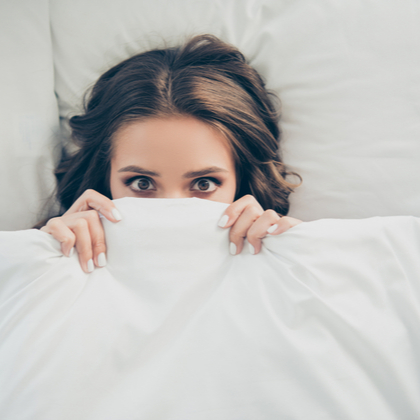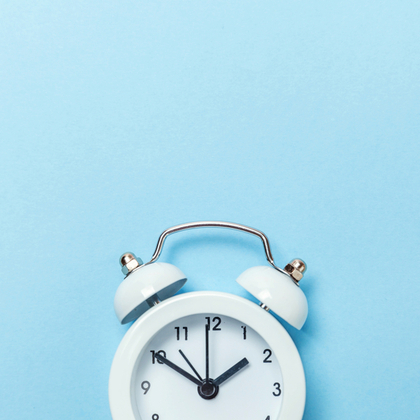
If you're struggling to get a good night's sleep, the culprit could be right in front of you. Most of us know that devices can disrupt sleep, yet we still keep screens close to hand at night.
Sleep experts now recommend removing technology from our sleeping environment. While this can feel like a huge change, it’s one of the easiest actionable ways to improve sleep quality and quantity.
Here, we take a look at why electronics keep you up and night, from blue light to overstimulation, and how to cut them out of your bedroom routine.
How does technology affect sleep?
Technology – phones, TVs, laptops, tablets, and smartwatches – can interfere with sleep in many ways.
Blue light
As diurnal creatures, we’re naturally programmed to be active during the day and sleep at night. Our body produces melatonin – a hormone that helps us feel sleepy – in response to darkness. Therefore, when it's dark outside and inside, our environment aligns perfectly with our evolutionary biology.
However, late-night use of devices that emit blue light confuses the brain and suppresses melatonin production (1). As a result, we feel alert and find it harder to fall and remain asleep.
Overexposure to blue light can also reduce time spent in slow-wave and REM sleep, both of which are critical for cognitive function and emotional regulation (2).
To help protect your eyes from light-induced damage, you may want to consider taking Eyewise®, which combines the properties of high-strength carotenoids – lutein and zeaxanthin.
Overly stimulating content
Blue light isn’t the only reason technology can disrupt your sleep. Your devices give you access to all the information in the world, which can overstimulate your brain and delay sleep onset.
Reading about a foreign conflict, watching a scary film, or checking work emails can put you in a state of neurophysiological arousal, which is the opposite of what you need to fall asleep. The fact that Netflix’s biggest competitor is sleep says it all (3).
Notifications
Notifications can also disturb sleep. If your phone buzzes or rings in the middle of the night, it can impact your sleep quality, even if you don’t fully wake up.
Simple ways to remove blue light technology from your bedroom
Technology has become a deeply entrenched part of our modern society, with the average screen use hitting 6 hours 37 minutes (4). However, it's crucial to maintain a balance and not let it run riot with our sleep.
Transitioning to a device-free bedroom can be a challenge at first, but it's worth it for a good night's rest.
Try a gradual approach
Health experts recommend disconnecting from technology an hour before bed. But this isn’t always easy. Rather than going cold turkey, you could try a gradual approach. Start by removing technology from your bedroom 10 minutes before sleeping this week, and 20 minutes before sleeping next week. Eventually, you could work up to one hour.
Have a technology curfew
Implementing a non-negotiable technology curfew means you won’t be tempted to watch one more episode or read another work email before bed. It will also help regulate your sleep-wake cycle. As mentioned, your curfew could get later as the weeks go on.
Use a designated box for devices
Make it easier to create a technology-free bedroom by having a dedicated box to put your devices and chargers outside your bedroom.
Form bedtime habits that don’t involve screens
Consider building your wind-down routine around activities that don’t involve technology, such as reading a book by a soft lamp, journaling, or doing some gentle stretching.
Invest in an old-fashioned alarm clock
Invest in an old-fashioned alarm clock instead of keeping your phone in your bedroom to wake you up in the morning. This way, you won't be tempted to use your phone in bed and can avoid the negative impact on your sleep.
Avoid working in bed
Your bed is supposed to be for sleeping and sex – nothing else. With this in mind, avoid working in bed as much as possible to help your brain associate it as a place of rest and relaxation.
You can read more about how working from your bedroom can affect your sleep here.
What if I can’t remove technology from my bedroom?
If you’re struggling to make your bedroom entirely technology-free, don’t worry. You can still reduce the impact of electronics on your sleep with these measures:
-
Avoid using screens one hour before bed
-
Silence all notifications and activate ‘Do Not Disturb’ on phones
-
Put devices on night mode and turn down the brightness
-
Consider using blue-light-blocking glasses at night
-
Put devices in a drawer before bed
Find out more
If you found this piece on how technology impacts sleep useful, you can find similar guidance on our dedicated Sleep Health Hub. Alternatively, please get in touch with our team of expert Nutrition Advisors, who are on hand to provide free, confidential advice via email, phone, and Live Chat.*
*Subject to cookie consent
References:
-
High sensitivity of the human circadian melatonin rhythm to resetting by short wavelength light. Lockley, S. W., Brainard, G. C., & Czeisler, C. A. (2003) The Journal of clinical endocrinology and metabolism. 88(9), 4502–4505.
-
Effects of pre-bedtime blue-light exposure on ratio of deep sleep in healthy young men. Ishizawa M, Uchiumi T, Takahata M, Yamaki M, Sato T. (2021) Sleep Med. 84:303-307.
-
Netflix’s biggest competitor? Sleep. Hern, A. (2017) The Guardian. Available online: https://www.theguardian.com/technology/2017/apr/18/netflix-competitor-sleep-uber-facebook
-
Screen time statistics 2023. Binns, R. (2023) Independent Advisor. Available online: https://www.independent.co.uk/advisor/vpn/screen-time-statistics
Related Posts

Do I Have Symptoms Of Insomnia Or Just Trouble Sleeping?

Insomnia Treatments: Natural Remedies To Help You Fall Asleep

Why Am I Always Tired? Signs Of Poor Sleep Hygiene Explained

Olivia
Olivia Salter has always been an avid health nut. After graduating from the University of Bristol, she began working for a nutritional consultancy where she discovered her passion for all things wellness-related. There, she executed much of the company’s content marketing strategy and found her niche in health writing, publishing articles in Women’s Health, Mind Body Green, Thrive and Psychologies.
View More
